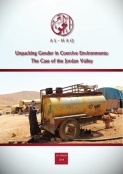Since 1967, Israel has systematically and unlawfully appropriated land in the Jordan Valley, located in Area C of the occupied West Bank. Israel’s violations of human rights across the Jordan Valley have created coercive environments intended to displace and forcibly transfer Palestinian communities from the region. Coercive environments created by Israel have demonstrable gendered impacts, disproportionately affecting the well-being and livelihoods of Palestinian women in the region.
Al-Haq’s new report Unpacking Gender in Coercive Environments: The Case of the Jordan Valley, is a side report to Settling Area C: The Jordan Valley Exposed. The report examines human rights violations that Palestinian communities face in the Jordan Valley area within the scope of Israel’s obligations, as Occupying Power. Accordingly, the report will examine Israel’s obligations under international humanitarian law and will provide a more in-depth examination of Israel’s international human rights law obligations in the OPT. In doing so, the report assesses the gendered dimensions of Israel’s violations of human rights across the Jordan Valley by analyzing the means through which Israeli practices intensify the vulnerabilities of Palestinian women and girls in the region. More specifically, the report demonstrates how coercive environments created by Israel undermine the rights of Palestinian women and girls to adequate housing, to adequate food, and to water and sanitation, as components of the right to an adequate standard of living, in addition to their rights to education and to the enjoyment of the highest attainable standard of physical and mental health.



